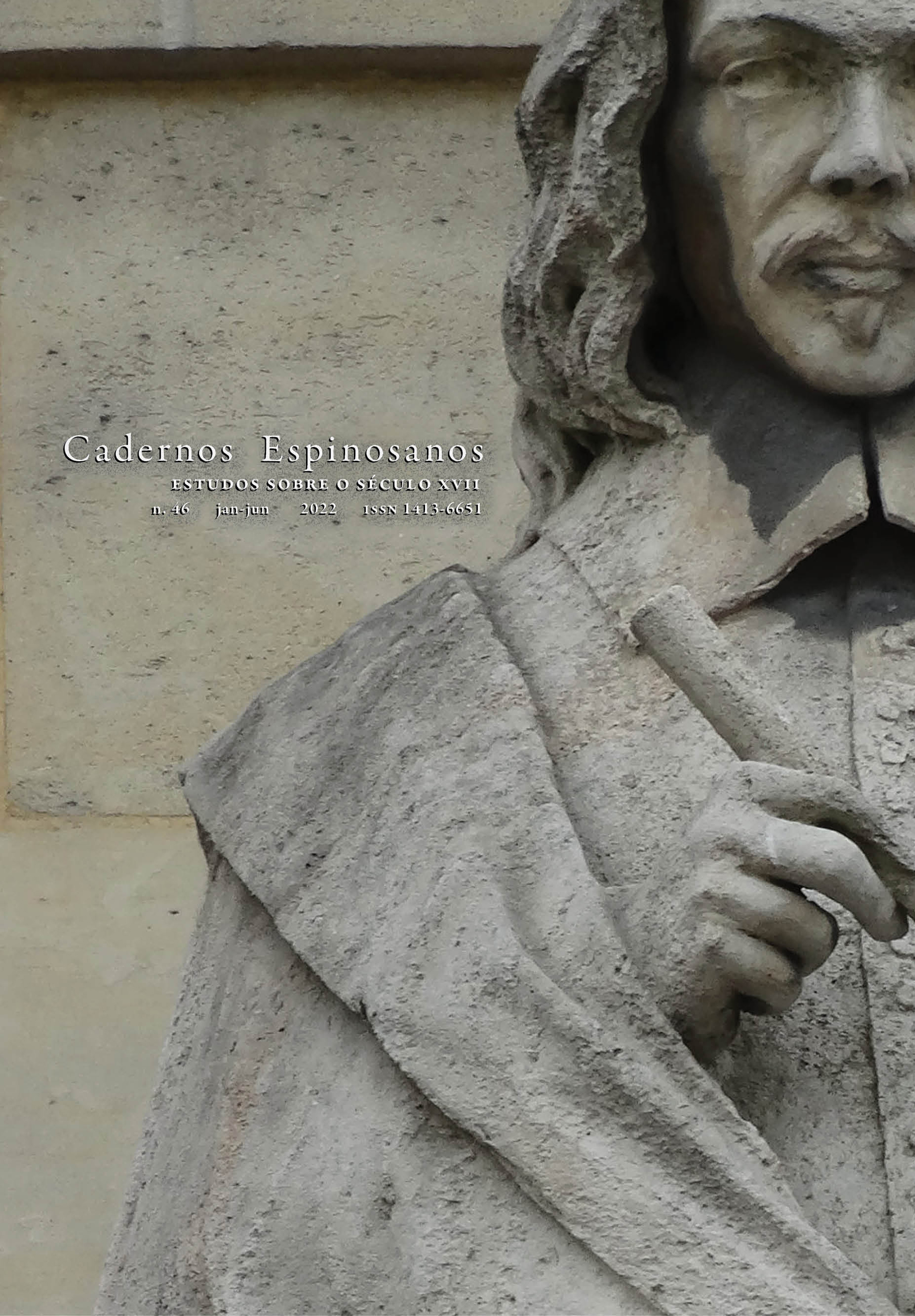The rules by Descartes: an interrupted epistemology
DOI:
https://doi.org/10.11606/issn.2447-9012.espinosa.2022.199609Keywords:
Descartes, Rules, Epistemology, Metaphysics, Eternal thruthsAbstract
The article aims to investigate the reasons that led Descartes to not conclude the Rules for the Direction of the Mind, establishing a relation between the interruption of this work and the theory of 1630 about the created nature of eternal truths. With the doctrine of the free creation of truths, Descartes presents a metaphysical proposal that required a revisitation of the assumptions of his own epistemology. If in the Rules mathematics and geometry were considered to be free from all uncertainty, with the theory of 1630 these disciplines are submitted to the arbitrary causality of divine omnipotence. This metaphysical consideration requires further reflection in order to assess its consequences. The project of the Rules – interrupted, but not abandoned – will be then revised in the light of the metaphysical novelty of 1630. The Meditations will take on this task, by demonstrating how the created nature of truths does not imply to call into question human knowledge.
Downloads
References
ALQUIE, F. (1987). La découverte métaphysique de l’homme chez Descartes. Paris : PUF.
CRAPULLI, G. (1964). “Note all’edizione critica di Adam-Tannery delle Regulae ad directionem ingenii di Descartes”, in: Rivista critica di storia della filosofia, vol. 19, n. 1, pp. 54-61.
DESCARTES, R. (1966). Regulae ad directionem ingenii. Texte critique établi par Giovanni Crapulli (Cr) avec la version hollandaise du XVIIe siècle. La Haye : M. Nijhoff.
DESCARTES, R. (1897) Correspondance, avril 1622 – février 1638. Oeuvres de Descartes, Tome I. Publiée par Charles Adam et Paul Tannery (AT). Paris : Léopold Cerf, imprimeur-éditeur.
DESCARTES, R. (1901) Correspondance, juillet 1643 – avil 1647. Oeuvres de Descartes, Tome IV. Publiée par Charles Adam et Paul Tannery (AT). Paris : Léopold Cerf, imprimeur-éditeur.
DESCARTES, R. (1904) Meditationes de Prima Philosophia. Oeuvres de Descartes, Tome VII. Publiée par Charles Adam et Paul Tannery (AT). Paris : Léopold Cerf, imprimeur-éditeur.
DESCARTES, R. (1908) Regulae ad directionem ingenii. Oeuvres de Descartes, Tome X. Publiée par Charles Adam et Paul Tannery (AT). Paris : Léopold Cerf, imprimeur-éditeur.
GUEROULT, M. (1968). Descartes selon l’ordre des raisons. Paris : Aubier.
HEIDEGGER, M. (2006). Einführung in die phänomenologische Forschung. Frankfurt am Main: Vittorio Klostermann.
MARION, J.-L. (1992). “Metodo e metafisica: le nature semplici”, in: BELGIOIOSO, B. (ed.) Cartesiana. Lecce: Congedo, pp. 3-27.
MARION, J.-L. (2000). Sur l’ontologie grise de Descartes. Paris : Vrin.
NATORP, P. (1882). Descartes, Erkenntnistheorie. Eine Studie zur Vorgeschichte des Kriticismus.Marburg : Elwert.
NATORP, P. (1896). “Le développement de la pensée de Descartes. Depuis les Regulae jusqu’aux Méditations”, in : Revue de Métaphysique et de Morale, vol. 4, n. 4, pp. 416-432.
VALENTIM, M. A. (2008). “Método e metafísica: Descartes entre as Regras e as Meditações”, in: Revista Dois Pontos, vol. 5, n. 1, pp. 43-66.
WEBER, J.-P. (1964) La constitution du texte des Regulae. Paris : Sedes.
Downloads
Published
Issue
Section
License

This work is licensed under a Creative Commons Attribution-NonCommercial-ShareAlike 4.0 International License.
Autores que publicam nesta revista concordam com os seguintes termos:
- Autores mantém os direitos autorais e concedem à revista o direito de primeira publicação, com o trabalho simultaneamente licenciado sob a Licença Creative Commons Attribution que permite o compartilhamento do trabalho com reconhecimento da autoria e publicação inicial nesta revista.
- Autores têm autorização para assumir contratos adicionais separadamente, para distribuição não-exclusiva da versão do trabalho publicada nesta revista (ex.: publicar em repositório institucional ou como capítulo de livro), com reconhecimento de autoria e publicação inicial nesta revista.
Authors who publish in this journal agree to the following terms:
b. Authors are authorized to take on additional contracts separately, to non-exclusive distribution of the article published in this journal (ex.: to publish in institutional repository or as part of a book), with an acknowledgment of its initial publication in this journal.


